

Urinary incontinence. Overview Urinary incontinence — the loss of bladder control — is a common and often embarrassing problem.
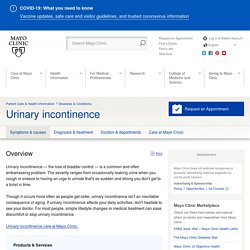
Is bladder training really beneficial? Ask the doctors Q.
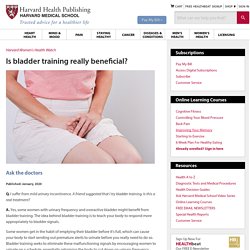
I suffer from mild urinary incontinence. A friend suggested that I try bladder training. Non-mesh sling: A treatment for stress urinary incontinence? I've heard there is a non-mesh sling procedure for the treatment of female stress urinary incontinence.
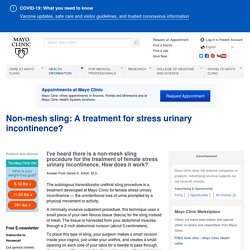
How does it work? Answer From Daniel S. Elliott, M.D. The autologous transobturator urethral sling procedure is a treatment developed at Mayo Clinic for female stress urinary incontinence — the unintentional loss of urine prompted by a physical movement or activity. A minimally invasive outpatient procedure, this technique uses a small piece of your own fibrous tissue (fascia) for the sling instead of mesh. Living Better with Benign Prostatic Hyperplasia. You don’t have to look for the bathroom at every restaurant.
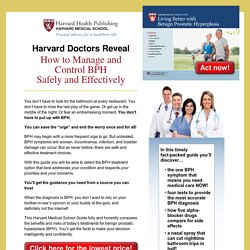
You don’t have to miss the last play of the game. Urinary Incontinence: Types, Causes, Treatment & More. Overview Urinary incontinence happens when you lose control of your bladder.
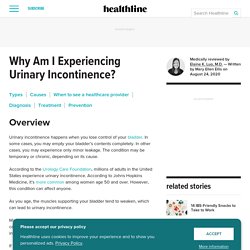
In some cases, you may empty your bladder’s contents completely. In other cases, you may experience only minor leakage. The condition may be temporary or chronic, depending on its cause. According to the Urology Care Foundation, millions of adults in the United States experience urinary incontinence. 004 – What to Do If You're Worried About Falls - Better Health While Aging. Maintaining Mobility & Preventing Falls in Aging: Myths & Truths. Maintaining Mobility & Preventing Falls in Aging: Myths & Truths. How to Exercise to Prevent Falls: Otago & Other Proven Programs. Clothing, odour control and skin care. Clothing.
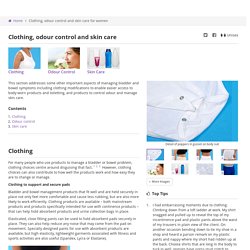
An emerging link between the urinary microbiome and urinary incontinence. Most people know that microorganisms live on our skin, and in other places in the body such as the digestive tract.
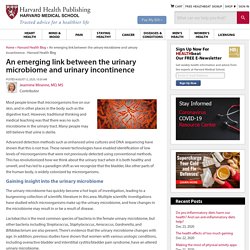
However, traditional thinking and medical teaching was that there was no such microbiome in the urinary tract. Many people may still believe that urine is sterile. 8 Things to Have the Doctor Check After an Aging Person Falls. Urinary Incontinence in Aging: What to know when you can’t wait to go - Better Health While Aging. Don’t let muscle mass go to waste.
Muscle atrophy, the loss of muscle tissue, can emerge after a period of inactivity.
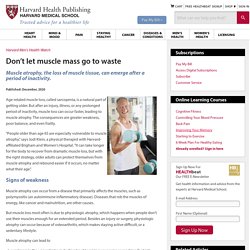
Age-related muscle loss, called sarcopenia, is a natural part of getting older. But after an injury, illness, or any prolonged period of inactivity, muscle loss can occur faster, leading to muscle atrophy. The consequences are greater weakness, poor balance, and even frailty. "People older than age 65 are especially vulnerable to muscle atrophy," says Jodi Klein, a physical therapist with Harvard-affiliated Brigham and Women's Hospital. "It can take longer for the body to recover from dramatic muscle loss, but with the right strategy, older adults can protect themselves from muscle atrophy and rebound easier if it occurs, no matter what their age. " Signs of weakness Muscle atrophy can occur from a disease that primarily affects the muscles, such as polymyositis (an autoimmune inflammatory disease). 5 of the best exercises you can ever do. Our best balance boosters. One in three people ages 65 or older will suffer a fall.
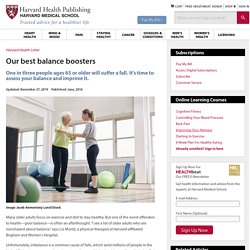
It's time to assess your balance and improve it. Image: Jacob Ammentorp Lund/iStock Many older adults focus on exercise and diet to stay healthy. Hearing loss may affect brain health. Parkinson's Disease. הפרעות הליכה ונפילות - בשיבה בריאה. Loss of taste and smell: Natural with aging? Some loss of taste and smell is natural with aging, especially after age 60.
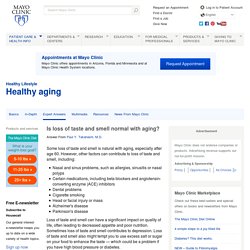
However, other factors can contribute to loss of taste and smell, including: Nasal and sinus problems, such as allergies, sinusitis or nasal polyps Certain medications, including beta blockers and angiotensin-converting enzyme (ACE) inhibitors Dental problems Cigarette smoking Head or facial injury or mass Alzheimer's disease Parkinson's disease Loss of taste and smell can have a significant impact on quality of life, often leading to decreased appetite and poor nutrition. Resources. The MIT AgeLab collaborates with its sponsors to conduct research to develop original insights, data and platforms for innovation. The AgeLab works with sponsors to translate that research into public education and resources that are helpful to families, students, researchers and the aging community. Safe Driving & Lifelong Transportation We Need to Talk: Family Conversations with Older Drivers addresses questions about whether a loved one is driving safely and provides ideas on how to initiate constructive conversations with loved ones around the driving issue.
Is Parkinson's disease hereditary? Genetics and causes. You have chosen to share the following article: How elderberries can help you fight the flu To proceed, simply complete the form below, and a link to the article will be sent by email on your behalf. Note: Please don't include any URLs in your comments, as they will be removed upon submission. We do not store details you enter into this form. Please see our privacy policy for more information. How 'exergaming' can help people with Parkinson's. You have chosen to share the following article: How elderberries can help you fight the flu To proceed, simply complete the form below, and a link to the article will be sent by email on your behalf. Note: Please don't include any URLs in your comments, as they will be removed upon submission.
We do not store details you enter into this form. Please see our privacy policy for more information. Fear of falling: efficacy of virtual reality associated with serious games in elderly people. Computer classes and games in virtual reality environment to reduce loneliness among students of an elderly reference center. New study identifies potential cause of age-related hearing loss.
Some degree of hearing loss is an inevitable attendant of the aging process. First goes the ability to hear high-frequency sounds like the voices of young children, then our ability to detect consonants like f, k, p, t, and s fail us. Eventually, the damage endured by our stereocilia (the tiny hair-like cells located in our cochlea) becomes beyond the point of repair.
Nearly 33% of people over the age of 65 are currently suffering from disabling hearing loss, though a biological explanation has only just now been identified…potentially at any rate. The authors derived their new report from a biobank containing genetic data from over 250,000 participants between the ages of 40 and 69. A questionnaire administered to participants of the biobank highlighted genes that govern important auditory pathways. “These findings are incredibly significant. 4 Key Things to Know About Hearing Loss in Aging. Publication Ordering System and Contact Report System. How Older Adults Can Get the Most Benefit From Medical Visits. Contributor: Ronan Factora, MD Cleveland Clinic is a non-profit academic medical center. Are You Losing Your Hearing as You Age? Feeling Unsteady? What You Should Know About Balance Problems. You bump into tables all the time.
How You Can Cope with Declining Senses as You Age. Aging changes in the senses: MedlinePlus Medical Encyclopedia. As you age, the way your senses (hearing, vision, taste, smell, touch) give you information about the world changes. Your senses become less sharp, and this can make it harder for you to notice details.